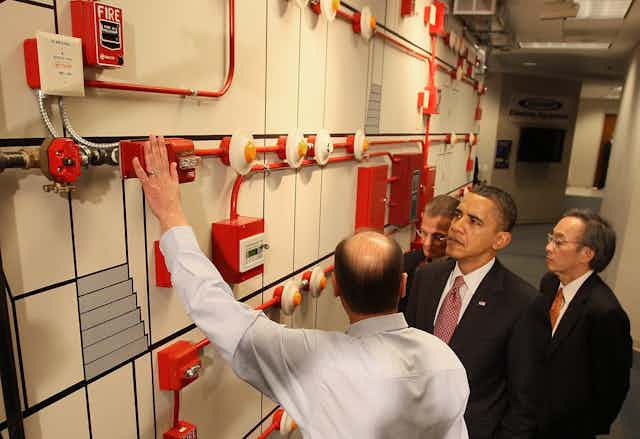President Obama’s inauguration speech this week presented a source of real hope for all those concerned about global climate change. With eight sentences, he devoted more of his address to this “wicked” problem than any other domestic or foreign policy challenge.
But what Obama said was far less significant than his choice of timing and platform. The President knew that important domestic and international audiences would be paying attention.
This wasn’t some Washington forum of environmentalists, scientists and business leaders. This was Obama making clear that progress on addressing climate change is going to be a key measure of the success of his second term.
These speeches are as important as any. They set the tone for a presidency and will structure the framework for policy development in the world’s largest economy over the next four years. And a second-term inauguration speech is especially important. It is crafted with an eye to legacy, in the knowledge that the president has fought his last election and there is only so much time to truly achieve ones policy ambition.
Six months before the 2005 British election, I recall standing with a small group of advisers and public servants outside the cabinet room at the back of Downing Street. Prime minister Tony Blair argued to the group that no matter the degree of enthusiasm, ability and commitment in the room, the problem with seeking a third mandate was that little one could say was fresh. When a new issue or approach was put forward, the question in the mind of the electorate was: why hadn’t it been dealt with already?
But the US is different. For a US president who has won a second term there is no “It’s Time” factor to worry about. Obama already knows the date he will be leaving the oval office, and every month, week and day that passes closes the window of opportunity around what he might achieve. Those are the rules: Amendment 22 of the US Constitution effectively creates the constraint to allow for policy innovation.
And notwithstanding the growth of economic and political power in China, India, Brazil and the other rapidly developing economies, it is the United States that still has an unparallelled hold over the world’s imagination. It isn’t that the US perspective on climate change is the key to unlocking global progress on climate change. It is just that we know that without it, progress is a good deal harder.
So what might Obama achieve? Can he achieve anything with the current Congress? What could be his legacy on climate?
Despite his silence and apparent lack of interest in the three years between Copenhagen and Hurricane Sandy, from the beginning of his presidency Obama has assembled a veritable “super group” with a deep knowledge of climate science and the infrastructure required to unlink economic growth from energy and emissions growth.
In his Energy Secretary Stephen Chu he has a Nobel prize-winning physicist who has devoted his career to developing and promoting low carbon energy technologies and infrastructure. In John Holdren, the President’s senior advisor on science and technology, he has someone with a deep knowledge of climate change and the most effective means of reducing emissions.
The president failed to get Congressional support for carbon pricing in the first term. But with more than $70 billion in direct spending and tax credits for clean energy, the American Recovery and Reinvestment Act of 2009 was the largest federal investment in US history in renewable energy, public transport, and energy efficiency.
Domestically, Obama will probably look to build on these initiatives by avoiding fights with a dysfunctional Congress. He will instead focus on administrative measures to reduce emissions from power plants and increase the carbon efficiency of the economy through a mix of demand and supply side regulations and incentives.
To do this, the president will have to build new alliances with environmentalists, scientists, business leaders and civil society. He knows that real progress will be impossible if the issue is viewed solely as an environmental challenge. It has to be about international competitiveness, innovation and energy security as well. Any progress will require a fundamental shift in the US, and global, energy economy. And leading this sort of change requires the ability to build a consensus across party lines that will give the policy agenda the consistency and stability required to shift investment from high carbon to low carbon infrastructure.
Internationally, Obama is unlikely to throw the focus to the next major UN meeting in Paris, where the rules of a post-2020 international climate regime are to be negotiated in 2015. His experience of flying into the Copenhagen negotiation makes it unlikely that he is going to want to expose himself to the anarchic and unedifying process of negotiating two pages of text to salvage a conference heading for failure.
More likely is the possibility of bilateral agreements between the US and other major emitters; support for an expansion and linking of carbon pricing mechanisms in the US states, Europe and potentially Australia and a clear and consistent message to investors that the US is looking to lead in the development and implementation of new low carbon technologies and infrastructure. It is through these measures that he can build the momentum towards any multilateral agreement.
In Copenhagen in 2009 I was fortunate to observe Obama working on this problem up close. No one there could question his grasp of the issue and his commitment to achieving progress. His gifts were used to avoid diplomatic catastrophe.
Observing how he uses those same gifts to build an effective US agenda on climate change will be more than fascinating. It may be the clearest measure of whether the world can rise to the challenge of reducing the potentially catastrophic effects of an ever-warming atmosphere. Achieve progress and that will be a legacy for which all under middle age, and those yet to be born, will be truly grateful.

